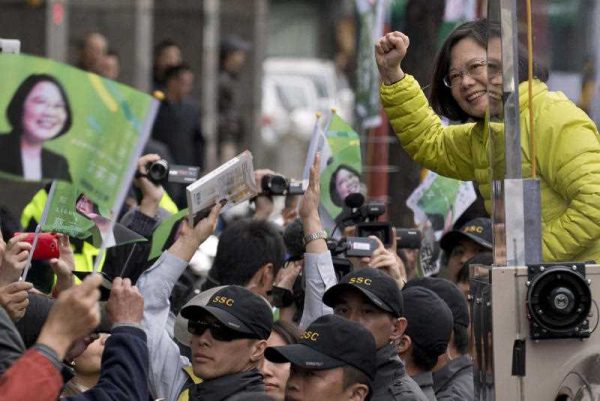The game was set long before it began. A reversal of the Kuomintang’s (KMT) domination of the Legislative Yuan is very likely. Hurt by internal strife, the morale of the ruling KMT is low. The opposition Democratic Progressive Party’s (DPP) presidential candidate Tsai Ing-wen leads the campaign by a huge margin. The emergence of multiple, small pan-blue affiliated parties threaten to further split votes for the KMT. Since the pro-independence DPP appears set to return to power, the risk of more turbulent cross-Strait relations is increasing.
The KMT is plagued by serious internal divisions, especially between President Ma Ying-jeou and the Speaker of the Legislative Yuan, Wang Jin-pyng. Due to such divisive party factionalism, few potential presidential candidates could have made it through the KMT’s presidential primary process. Even worse, a number of KMT incumbent Legislative Yuan members decided to drop out of the elections, leaving the party shakier than ever.
The deputy speaker of the legislature, Hung Hsiu-chu surprisingly went through the primary alone and obtained the party’s nomination for presidential bid. But Hung’s policies were considered too close to Beijing’s and threatened to damage the KMT’s chance of winning a majority in the legislature. As a result, KMT leaders replaced her with party chairman Chu Li-luan in October 2015.
The KMT has already lost majority control of the municipalities and counties, following a major defeat in the nine-in-one elections held on 29 November 2014. But the party’s leaders have failed to reform and the Ma–Wang strife caused repeated political blunders throughout 2015. Despite an outstanding performance during the first televised debate, Chu has not been able to integrate the competing factions within the KMT. Neither could he manage to turn around the plummeting popularity of the incumbent government just three months before the general elections. And Taiwan’s younger generation is not fond of the conservative KMT.
Taiwan’s political landscape has traditionally been dominated by a large KMT majority. But analysts speculate that the KMT will barely hold onto minimum levels of support. Since the beginning of the race, Tsai has consistently led her competitors by more than 20 per cent in polls. A landslide victory would give the DPP a unified government, and a chance to redirect Taiwan’s political structure and democratic future.
Tsai has not yet clearly articulated many key policies, including how she will manage the crucial relationship with mainland China. Yet support for her remains high. It seems that the DPP is not likely to win because of their promising policies, but because the KMT is crumbling.
Many Taiwanese support Tsai’s more circumspect attitude towards mainland China, even though her exact position on cross-Strait relation remains very ambiguous. Tsai has publicly rejected the ‘1992 Consensus’, supported by the KMT and the Chinese Communist Party, yet she has committed to ‘maintaining the status quo’, despite not having elaborated on what this means.
Along the campaign trail, the DPP’s position on the maritime territorial disputes in the South China Sea has also been questioned. Although Tsai has failed to detail her policy on this issue too, many believe that she will try to sail through this dangerous policy zone and maintain Taiwan’s existing policies.
Strategically, it is understandable that Tsai feels that there is no urgent need to clarify her foreign policy as long as she is leading the polls. Maintaining some political ambiguity is critical for Tsai, as she has to accommodate different political forces within her party, especially hardline pro-independence supporters.
But it would be a serious challenge to Beijing if Tsai does reject the ‘1992 Consensus’ after taking over the government as expected in May 2016. For the last eight years, this ambiguous agreement on the One China policy has served as a magic formula for facilitating positive ties between China and Taiwan. It would be difficult to continue present courses of communication if Tsai does not recognise the consensus.
Chinese President Xi Jinping seems to realise the challenges of engaging with a DPP government in Taiwan and has pushed to review current approaches to Taiwan. Xi took a brave move in holding a summit with President Ma on 7 November 2015 in the hopes of laying the groundwork for the future of cross-Strait relations. Of course, when push comes to shove, Beijing is well prepared on all fronts to cope with the DPP.
DPP’s foreign policy approach emphasises deeper relations with the United States and Japan, rather than mainland China. But pursuing this approach to cross-Strait relations will be a big challenge for the DPP government. The political reality is that Taiwan does not have much leverage in its relations with China or with other key players in the region. Despite the DPP’s less accommodating policy inclinations, pragmatic considerations will likely force the DPP and Beijing to build reliable channels for dialogue immediately after the election.
Fu-Kuo Liu is a Research Fellow at the Institute of International Relations, National Chengchi University, Taiwan.


“””” For the last eight years, this ambiguous agreement on the One China policy has served as a magic formula for facilitating positive ties between China and Taiwan. “””
This is rank nonsense. China has never accepted the 1992C. It merely insists that the DPP does. The KMT and CCP can talk to each other any time, and do not need a fake consensus that was invented in the run-up to the 2000 election, as many key figures have confirmed.
The actual basis for relations between the two Leninist authoritarian parties on either side of the Strait is China’s desire to annex Taiwan.
Interesting point! It reflects extactly what Taiwan independence activists claim: rejecting the “1992 consensus”. Beijing originally did not want to accept the consensus. But, when President Lee Teng-hui announced the “two states” theory, Beijing then reviewed it and found that the 1992 consensus would be significant to link Taiwan and China on the same basis. For sure, since Lien (Chan) -Hu (Jintao) summit in 20o5, the consensus has been accepted as Bejing’s position.